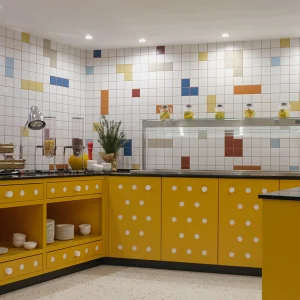
Facilities management isn’t all about offices. Although the majority of trade magazines and events concentrate on the role of the facilities professional in a corporate environment, FMs work everywhere from schools, hospitals and universities to leisure centres, shopping centres and sports stadia. So what are the challenges for FMs of unusual environments? As varied as the types of unusual environments, is the short answer.
Facilities management provider Servest delivers services across a range of unique and unusual environments including the Science Museum, Tesco distribution centres and stores, and to London 2012. But even the most unusual facilities experience the usual problems. ‘Our clients face a growing compliance burden – whether that’s in health and safety, security or elsewhere,’ says Les Turner, Servest’s divisional managing director. ‘Rising energy costs are a key concern and, of course, for many clients pressure on capital expenditure and operating budgets is a daily reality. And then there are the challenges specific to the facility and the unusual facilities do have their unique challenges.’
The Science Museum has more than million visitors each year, with 20,000 recorded on one day during a school half-term break last year. That level of traffic places great demands on FM, particularly visitor reception, security, washrooms, cleaning and waste management.
And then there are the challenges of dealing with the public. Then there are the young children who can’t find their parents, the tourists who need directions but who don’t speak English, and the parties of boisterous schoolchildren who can be a law unto themselves. Servest’s operatives all have a customer-facing role, so training on dealing with the public is crucial.
Serving its customers to the best of its abilities and attracting visitors to the NEC is something the dedicated site-based team at the NEC Group venues is accustomed to doing on a day-to-day basis. Since commencing the soft FM contract in July last year – following a six-month complex mobilisation, the National Exhibition Centre, LG Arena, International Convention Centre and National Indoor Arena’s international total facilities management provider OCS has supported the NEC in welcoming more than 3.5 million visitors to more than 700 diverse and varied events. These include trade exhibitions, such as the Spring Fair and the Facilities Show, live bands, consumer shows including Gardeners’ World, and major sporting events including the BMX Championships, Horse of the Year Show, World Indoor Athletics, and Top Gear Live.
Breaking down an exhibition and building up the space for the next one involves a slick operation system that OCS, as part of Team NEC, deploys on a daily basis. The process involves a team of dedicated staff , dealing with any mess left over from the previous exhibition and disposing of post-show waste in a way that helps the NEC to maintain its ‘zero waste to landfill’ status. With the hall cleaned, the space is then handed over to the rigging, drape and electrical teams that gut the sub-floor tracks of all mains wiring and re-lay for the next show. All of this takes great management, and OCS works collaboratively with all service partners that are based on site.
In the less busy periods, such as in the summer months, the FM team plans ahead and sets about a programme of deep cleaning each hall, with prior agreement with the client. A deep clean largely involves cleaning the higher, structural aspects of the halls and it can take a team of mobile elevating work platforms (MEWPs) up to five days to cover an empty hall. Spread that across all 20 halls and the scale of the operation becomes all the more impressive. Operating with all these peaks and troughs demands a highly flexible, cross-trained, step-up step-down workforce.
OCS has its on-site training academy. Multiskilled, fully vetted staff can be deployed across the NEC Group’s portfolio. In busy periods, with months of careful strategic planning already done, it’s all hands on deck with the operatives out in full force to ensure that events play out as seamlessly as possible.
But OCS is adept at managing unique environments – its client list includes St George’s Park, the FA’s National Football Centre in Burton-on-Trent, the Port of Dover and a network of airports across the world. Gatwick Airport, for example, boasts the world’s busiest single-use runway, averaging 52 aircraft movements an hour. Last year alone, more than 34.2 million passengers passed through Gatwick. OCS provides aircraft turnaround services to more than 20 clients, including BA, Emirates and Monarch, while also providing terminal FM support and services for persons with reduced mobility.
Grooming and searching an aircraft is a complex procedure requiring impeccable attention to timing and detail. At best, the grooming team has six hours to do the job; at worst, eight minutes. This service has to be repeated again and again throughout the day for each plane landing at its exact allotted time – or not, as the case may be. Unpredictable external factors can have chaotic knock-on effects on the team’s work – the impact of heavy rain, wind and snow can cause serious delays that must be worked around. Teams are specially trained to look for suspicious devices but are often uncovering iPods, mobile phones and other items left behind by passengers.
Then there are the ordinary offices that present unusual challenges when they fall vacant, whether through a planned refurb, a tenant leaving or after a flood or a fire. ‘Vacant properties can pose unique challenges to facilities managers, given the significant risks associated with them, such as being magnets for squatting, vandalism, metal theft, arson, graffiti and fly-tipping,’ says Mark Cosh, director at vacant property security expert SitexOrbis. And it is usually the facilities manager who bears the responsibility for managing empty buildings.
The work might include managing the building’s closure by assessing the risk of intruders; informing the insurer about the change in occupancy status (or risk any pay-out in the event of damage); securing the premises, tailoring the security measures to the property’s location and type; and managing the property on an ongoing basis, including doing regular inspections to stop small problems escalating.
There are also the services usually delivered to office environments that present unique challenges when delivered to unusual environments. Workplace consultancy Advanced Workplace Associates worked with Littlewoods to move its HQ to new premises in an historic refurbished aircraft hangar at the site of the former Liverpool Airport.
AWA was tasked with helping Littlewoods to implement changes to its culture and working practices including introducing an open-plan, high-visibility environment that encouraged teamwork and interaction. ‘While the solution was very process driven – including introducing a process for managing samples – and could have been implemented in any building, the solution had to take into account the unusual structure of the building, and make the most of it,’ said Richard Watts, AWA’s project manager.
Fruitful Office, which delivers fresh fruit to workplaces throughout the UK, acknowledges that delivering to clients outside the usual office environment can sometimes be tricky. Fruitful delivers baskets of fresh fruit to the Taylor Woodrow Construction team working on the £700m upgrade of London’s iconic Victoria Station.
This delivery is the company’s trickiest, says Fruitful Office director Vasco de Castro. ‘The offices are located in a collection of portable buildings sitting above the entrance to the station. It is one of the busiest and most secure locations in London and parking is very challenging.’
Hospitality services provider Bennett Hay delivers a staff restaurant, cafe/deli bar, hospitality and events service to the Nordic financial services group SEB. Once a year, Bennett Hay caters for a SEB day-long charity event at the National Rifle Association’s prestigious National Shooting Centre in Bisley, Surrey. The work includes putting up a marquee; providing breakfast hampers, a bar, a sit-down lunch and afternoon tea; managing the awards ceremony, and cleaning up at the end of the day. ‘We have to be flexible in our approach [to this] as we do in the office environment,’ said Bennett Hay director, Anthony Bennett. ‘But at Bisley we’re also working with the weather and with the timings of the shoot, which can go on for longer than expected."
But it’s not all about weather and clock-watching. ‘It’s actually an excellent team-building event for our own staff and a lot of fun to cater for. The executives are there to have fun so they tend to be more relaxed and less formal. Our staff have the chance to interact with them in a less formal way, while maintaining their professionalism. It’s always a real success and goes to show that it doesn’t matter where you are, you can always replicate great service anywhere.’
The same can surely be said of great facilities management.
FM tasks with byte
Few FMs anywhere, never mind at unusual facilities, have regular access to a comfy chair and desk, let alone a desktop computer, but they still need to manage assets, run maintenance regimes and respond to helpdesk queries. Many use facilities management software for support, and in an unusual environment with particularly complex equipment to maintain, having good FM software system can be vital.
The National Oceanography Centre (NOC) has been supported by Service Works Group’s QFM product – a market-leading powerful, customisable fM software application – since 2000. The centre, a wholly-owned research centre of the Natural Environment Research Council that covers in excess of 50,000 sq m, on a site of nearly 13 acres, has two ocean-going ships and accommodates a range of intricate equipment. QFM is used by NOC’s facilities team to control both planned maintenance routines and to enable a quick response to building users’ job requests. It also provides comprehensive, accurate and informative reporting on the vast array of complex equipment housed at NOC.
‘For FMs on the move, particularly in unusual or challenging environments, accessing software on tablet devices or PDAs is essential, keeping them up to date with the latest goings on across their estate without having to be in front of a computer,’ says Annie Gales, director at Service Works. QFM for Tablets also provides the capability to manage an organisation’s assets using QR codes (in order to access detailed data such as asset history and performance) – which can be particularly useful across unusual environments such as supermarket and high-street distribution centres and stores.





